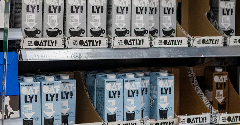News
Make prices clearer for consumers, UK competition watchdog tells supermarkets
10 Aug 2023The UK’s Competition and Markets Authority (CMA) has told UK supermarkets to make their prices more transparent to aid shoppers during the cost-of-living crisis.
In a newly published preliminary report, the UK’s competition watchdog concluded that food prices are not being clearly and fairly displayed in supermarkets leading to shoppers losing out on deals.
According to the CMA, parts of the issue stem from the unit pricing rules themselves, which allow unhelpful inconsistencies in retailers’ practices and leave too much scope for interpretation.

“With so many people struggling to feed their families, it’s vital that we do everything we can to make sure people find the best prices easily,” said Sarah Cardell, CEO of the CMA.
“We’re writing to these retailers and warning them to make the necessary changes or risk facing enforcement action. The law itself needs to be tightened here, so we are also calling on the government to bring in reforms.”
Pricing practices of most concern to the CMA
The CMA’s concerns specifically relate to the consistency of supermarkets in the measurements used for similar types of products.
The report said that this made it difficult for consumers to compare deals on a like-for-like basis. For example, tea bags being priced per 100 grams for some products and others being unit priced per each tea bag.
Also under scrutiny was the degree of transparency supermarkets were working to with cases of missing or incorrectly calculated unit pricing information highlighted both in store and online.
The report gave an example of a 250ml handwash costing €1.80 (£1.19) but unit priced at €552.00 (£476.00) per 100ml. Here, unit pricing information was unavailable online until items were selected.
Other points of concern was legibility, where unit pricing information was difficult to read, for example text on labels being too small or shelf edge labels being obscured by promotional information or by shop fittings.
The CMA also highlighted supermarkets’ approach to promotions, where some retailers were not displaying unit prices for any products on promotion.
Varying interpretation of the Price Marking Order 2004 (PMO)
In setting out the issues, the CMA also set out recommendations on the unit pricing rules whilst also calling on the government to reform current legislation. The CMA will publish its findings in Autumn 2023.
One possible explanation for the confusion facing consumers are the stipulations relating to unit prices that are outlined in the Price Marking Order 2004 (PMO).
While this rule requires the unit price must be given to consumers in writing (this includes in catalogues, in shops and via the internet), for goods offered for retail sale, it also allows for “unhelpful inconsistencies in retailers practices and leave too much scope for interpretation,” the CMA said.
UK consumer watchdog Which? agreed with this in a new policy paper describing the PMO as “outdated and in need of reform.”
 © AdobeStock/WavebreakMediaMicro
© AdobeStock/WavebreakMediaMicro
“But it is also because different retailers interpret the current law and guidance differently, with some making it easier to compare prices than others,” in an echo to the CMA’s comments.
Which? recommended two immediate improvements
Some of the immediate improvements recommended by Which? include making it easier to assess if promotions offer best value, a particular issue for some supermarket loyalty card pricing.
“We recently highlighted how we thought Tesco could potentially be in breach of the Consumer Protection from Unfair Trading Regulations 2008 (CPRs) because it does not include unit pricing on Clubcard prices, in contrast to Sainsbury’s who do this for Nectar prices,” they said.
Another short-term improvement was improving legibility of unit pricing, where Which? investigations found large variation in terms of prominence, size relative to the selling price and use of colours or contrast within, as well as across supermarkets.
“Current legislation and guidance is not very clear about what is appropriate,” the watchdog group said. “Clearer guidance should therefore be provided, setting out what is best practice.
“There is an International Standards Organisation (ISO 21041: 2018) standard on unit pricing, which should be used by supermarkets – but greater clarity from government is also needed.”
BRC: ‘Supermarkets working hard to support customers’
Responding to the CMA report, Helen Dickinson, Chief Executive of the British Retail Consortium (BRC), said, “Supermarkets have been working hard to support their customers through the cost of living crisis and will be reflecting on the CMA’s recommendations on unit pricing.
The CMA itself notes that “many of these problems stem from the rules themselves,” and retailers stand ready to support proposed changes to the unit pricing rules.
“As noted in the report, supermarket margins have remained extremely tight as they try to support their customers and absorb the worst of the rising costs in the supply chain.
“In the last few months, some of these pressures have begun to ease, such as with global commodity prices and the weakness of the pound."
Related news

The functional ingredient wave changing grocery retail as we know it
23 Jan 2024
Supermarket shelves are adapting to account for consumer demand for functional ingredients including in some surprising categories. Think collagen breakfast cereal and melatonin-infused sparkling water, says Brandon Casteel, vice president of partnersh...
Read more
UK High Court allows Oatly to use 'milk' on packaging
17 Jan 2024
Oatly has scored a landmark victory in the use of the word milk after the UK High Court ruled against the country’s dairy industry and permitted the term to be used on packaging.
Read more
Alt-protein dip not enough to distract consumers from meat replacement realties
12 Jan 2024
Despite a recent downturn in alt-protein’s fortunes, consumers haven’t lost faith in the idea of cultivated meats and plant-based food becoming a permanent fixture in diets of the future, according to Alex Mayers, managing director of the Good Food Ins...
Read more
Supergrain fonio expands its reach in US market
11 Jan 2024
More US consumers will find nutritious, climate-smart grain fonio in supermarkets thanks to a new distribution structure for the import’s most prominent commercial brand, Yolélé.
Read more
PepsiCo to reshape convenient foods portfolio with less sodium and more plant proteins
10 Jan 2024
PepsiCo has revealed details of two nutrition goals that look to reduce sodium and boost consumption of legumes, whole grains, and plant-based proteins as part of the multinational’s expanded convenient foods portfolio.
Read more
Supermarkets innovate with private label plant-based ranges
9 Jan 2024
Plant-based product ranges are an important part of retailers’ private label innovation efforts – and represent an important way for supermarkets to reduce their environmental impact.
Read more
‘Healthy’ additives make ultra-processed foods more appealing
4 Jan 2024
Almost three-quarters (74%) of Americans would try an ultra-processed food if it provided a health benefit such as better sleep, better immunity, or increased energy, according to an industry survey.
Read more
South-East Asia: Renewed interest in sports nutrition products
19 Dec 2023
South-East Asia’s renewed focus on the elderly has also given rise to an emerging sports nutrition sector that serves to address similar health issues such as immune support and bone and joint health.
Read more
Coca-Cola: Artificial intelligence could help vet open innovation partners
18 Dec 2023
Artificial Intelligence (AI) could have a role to play in selecting startups and projects that corporates work with in open innovation partnerships, said Faisal Zanjani, global head of open innovation at The Coca-Cola Company, at Fi Europe.
Read more
Colombia introduces tax on ultra-processed foods
7 Dec 2023
In a bid to curb rates of obesity and other non-communicable disease, the Colombian government has introduced a tax on various ultra-processed food (UPF) and drink products.
Read more